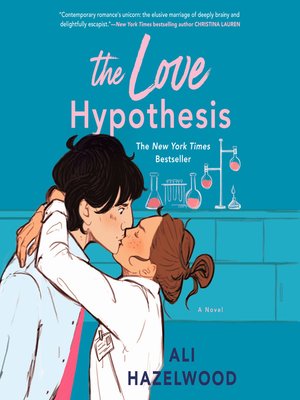 Think the Hating Game with fake dating in academia.
Think the Hating Game with fake dating in academia.
Plot: Olive is a PhD student trying to unlock the secret of early pancreatic cancer detection. She’s also a deeply, deeply lonely person despite her two best friends. So when one of those best friends develops a crush on a guy Olive was very briefly, very casually dating, Olive is determined to figure out a way to make those crazy kids get together. What better way than to show them she’s moved on? Only she’s not a big dater, so in a moment of desperation, she kisses the first dude she spots when her best friend is walking by. That dude is no other than the most feared faculty member at Stanford. One kiss isn’t enough to prove herself to her best friend, and turns out Adam needs to prove to the admin that he’s rooted in the area. Fake dating is the only solution. Shenanigans ensue.
The set up obviously requires a lot of suspension of one’s disbelief, even for a fake dating trope. Hazlewood asks us to accept this because Olive is deeply, deeply lonely. She’s basically been on her own since she was a teen and her two best friends are the only family she has, so of course she would go out of her way to help her family be happy. But her fear manifests at random. She’s very open with Anh and Malcolm, very quick to seek their advice, and very affectionate. She does not seem to have any fear at all that they will leave her or distrust her when she says something or take issue with her pursuing her own interests and goals.
I think the issue is that I just don’t understand characters like Olive. Olive is the only obstacle to Olive’s happiness, and she works VERY hard to get in her own way. Not in a low confidence sort of way, but in a making the wrong decision in literally every situation with mountain sized red flags waving at her kind of way. In one scene, she’s explicitly told by Adam’s best friend that he’d had a thing for her for a long time, which she interprets as meaning that it must be someone else he’d had a thing for and that she’s actually in the way of his happiness with the fake dating thing. That is some Olympic level self-sabotage. Then there’s the fact that nearly everything she tells anyone throughout the book are terrible, pointless lies. And fine, that’s what character development is for. Only even 90% into the book, she hasn’t learned a damn thing, and then of course, magically, she does and everything works out perfectly the end. That lack of a believable (to me) character arc sinks this book for me.
This misreading of signals is not only a sign of her emotional immaturity, it also demonstrates an ill chosen narrative structure for the story. She misreads a million very, very obvious signals that Adam cares for her deeply but somehow is still able to spot and describe them to the audience in a way that clearly demonstrates to the reader what an idiot she’s being. How is she both picking up these signals and not? It’s one thing if this book was written from both Adam and Olive’s perspectives, because then you could have Olive miss these signals outright and have her behaviour make sense while still getting Adam’s perspective, but one-sided narration means that if she doesn’t see it neither do we and in this case, it makes her actions look insane. The alternative would be for Adam to be less painfully obvious but it would likely be difficult to maintain momentum without at least the audience in on his feelings.
Last note on Olive’s character inconsistency. She’s written as demi-sexual. She doesn’t think much about sex and hasn’t met anyone she’s been interested in in a very long time. Cool. But when she first kisses Adam, she’s kissing a literal stranger and she’s into that kiss. So it kind of seems like how Hazlewood explains away a pretty 26 year old woman who isn’t experienced rather than true representation. Also, referring to herself as broken because she doesn’t experience instant attraction based on appearance is not a good look. It’s fine for a character to think that, because a lot of people who experience attraction differently from the “normal” feel that way, but putting it on the table, I think the author has an obligation to then refute it in some way. Here, we are left with the impression that Olive is indeed broken all the way to the end.
Olive isn’t the only character that is written inconsistently in service to the plot. The big last act complication arises from straight up character assassination. There is a character presented as a decent if bro-y person who turns into a cartoonish, mustache twirling villain at the drop of a hat. It was a cheap plot twist that I think does more to undermine real problems of sexual harassment and abuse in STEM and academia than shed light on it since victims don’t usually have their abusers going full Dr. Evil while being recorded. It makes one character we’re supposed to love come across as a blind idiot and another as a spineless enabler and robs them of the opportunity to demonstrate that they would believe the victim even without concrete proof.
The writing itself is pretty good, especially for a debut novel. There’s good banter, and the author is obviously very knowledgeable about the world of academia and STEM. I’m not excluding the possibility of picking up Hazlewood’s next novel, but I’m also not going to rush out to get it and I definitely won’t tough it out if the first third goes like this one did.
